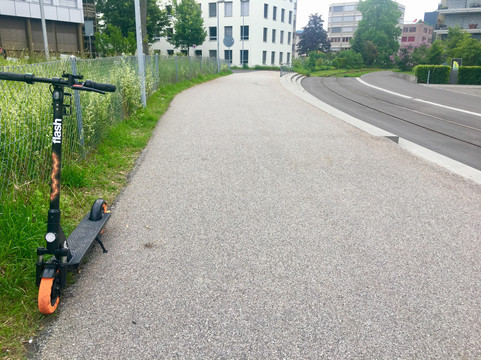While I was not surprised to see them appear on the streets of Zurich, I was somehow puzzled to see electric scooters find their ways in Zug. Freefloating has become a mobility trend, that's for sure, but in view of the city's requirements, size and current room for improvement with regard to transportation, I am not sure this was the smartest move.
Scootering or not scootering, that is the question
Over the past months, e-scooters have raised so many questions regarding for instance safety and traffic rules on the roads in many cities, knowing that such engines can drive up to 25km/h, can be left randomly in the street and therefore disturb pedestrian mobility (including disabled people, families and children), require the production of batteries and generate excessive amount of waste,... and so on and so forth.
The debate has been burning in France for instance, in which a new traffic law has been passed to better control the increasing amount of e-scooters in the streets. According to the new rules, users will be fined for driving or parking on pedestrian accesses, obliging them to share the streets with cars or make their way together with cyclists on dedicated bike paths (which, to my opinion, is another source of absurd risks).
The new rules do not mandate any obligations regarding helmets for adults, and I have heard medical specialists discuss on the radio the new types of injuries and medical emergencies they are confronted to due to the lost of control of the engines or collisions at full speed.
One of my first article in Zug was about my mobility in the city, and if you go back to this post you will fast understand why I am reluctant to see more freefloating options in Zug, whose public transportation is as efficient as it can be (especially from a Parisian-born person's perspective).
I haven't been confident sharing the roads with cars in many parts of the city (in sections in which dedicated bike paths are only distinguished by a line of yellow paint for instance), that giving access to an other, fairly silent, motorized vehicle makes me even more nervous.
The concept of freefloating mobility carries pros and cons, especially in big cities where driving cars has become a challenge (either due to traffic and/or measures leading to the voluntary reduction of traffic such as increase in parking fees, reduction of parking spots, city taxes, etc...) or in places where freefloating scooters or bikes can be a good back-up to public transportation.
My perceptions have always been poor, however.
I have seen many broken (voluntarily or not) ones, many scooters ending their way on rivers or "bike graveyards".
I have seen in other cities so many scooters and bikes parked randomly on both pedestrian or bike paths, blocking strategic access to strollers or people in wheelchairs, that I had to grind my teeth a few times. In a max.10 minutes-long bus ride next to the Zugersee, i have seen already 7 randomly-parked scooters in town - 4 others were to be found between the strip Baar Lindenpark - Feldhof.
I have heard so many stories of electric scooters getting wild on roads - and no longer than 5 days ago I have seen some extremely risky behaviours at full speed on the roads of Zug, and it was close that the scooter got hit by a bus at an intersection.
One could discuss also pratical factors such as charging requirements: scooters can be located via their in-built-GPS systems and picked to be recharged, before being replaced on the street the day after. The biggest e-scooters companies in the world such as Lime have been pointed at also for providing poor labour conditions to their "collector" staff responsible for the charging of scooters over night.

How will that work in Zug?
The article of Zentral+ "Was E-Trottis auf Zuger Verkehrsinseln zu suchen haben" provides more details about actual plans in Zug and the development of freefloating mobility in town.
I had tried to find more information, as suggested in the article of the Zuger Woche, by referring to the Zug Online website (in German), but I could only find a comparison table of all bike and scooter rental schemes in the city.
Here are then key information for users:
Only 50 Flash scooters so far have received their immatriculations to be parked and ciruclate in the city of Zug.
The geographical scope is therefore limited to Zug city itself; beyond the city's borders the scooters will gradually lose speed.
All works through a GPS-based app, so that one can find the closest scooter ready to be used.
It costs 1 CHF to unlock the scooter, then 0,25 CHF per minute of use.
With a full charge, a scooter can last up to 30km.
A scooter is around 18kg heavy and can ride at 20-25km/hour at full capacity.
the overall plan is to increase the city's freefloating mobility and extend the offer further to 200 bikes and 200 e-bikes in the summer.
The scooters cannot be loaded back in Zug, and are then transported back and forth to Zurich to proceed (and placed back in Zug cities again).
What does the Swiss law say?
Next step to collect infos was to visit the site of the Swiss authorities and learn more about existing rules. The article (also available in German and Italian) covers the private purchase of e-scooters, but I take for granted that the same traffic rules apply:
your scooter needs to be certified and receive accreditation to be allowed on the streets.
the driver needs to have a M-level driving licence (same level as to ride a small category motorcycle).
based on the above point, people aged under 14 are not allowed to drive them.
e-scooters are not allowed to drive on pedestrian paths and zones.
If the above points are not respected, the driver is eligible to receive a fine or be reported to the police.




Comments